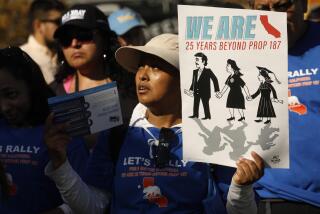Even Mollycoddlers Now Are Ready to Slap On the Cuffs
The new mood is far from universal, and there is still little consensus on policy. But in the wake of 9/11, with the prospect of immigration reform looming larger in Washington, pro-immigrant groups on the right and left are getting increasingly serious about enforcement. Tougher enforcement alone will not solve the problem. But these advocates grasp that any reform worthy of the name must restore the public’s confidence in the immigration system, and that the only way to do that is by regaining control of our borders.
This shift has been in the works for years. More pragmatic immigrant-rights advocates have long understood that unrealistic, unenforceable immigration laws were bad for everyone. But the attacks on 9/11 brought a new emphasis on domestic security. The 2002 Enhanced Border Security and Visa Entry Reform Act was, in significant part, the brainchild of immigrant advocates. Sponsored by, among others, longtime immigrant champion Sen. Edward M. Kennedy (D-Mass.), it mandated tougher inspections on the border and better screening of foreigners applying for visas at U.S. consulates. Pro-immigration lobbyists played an important role in moving the legislation through Congress, and by the time it passed, “enforcement” was a permanent part of their vocabulary.
Then, in January 2004, President Bush announced his guest worker program. The deliberately sketchy White House proposal, which included a transitional measure requiring illegal immigrants to register with the government, galvanized others to start formulating detailed policies. And much of that effort has focused on enforcement, which the president hardly mentioned.
Bush’s involvement also made it safe for Republicans to join the fight for immigration reform, and they have underscored the need for tougher enforcement as an end in itself and as a way to address voters’ anger at illegal immigration.
In this new climate, pro-immigrant organizations, such as the American Immigration Lawyers Assn., have been crafting enforcement measures to go along with reform of the kind Bush is proposing. Still other groups, such as the New American Opportunity Campaign, are working outside the Beltway to generate grass-roots support for ideas from Washington.
Among the proposals under discussion is a system that would require businesses to use swipe cards to verify that all employees are in the country legally and impose stiff penalties on companies that hire illegal immigrants. Immigrant advocates have traditionally opposed such verification because it gives employers too much power over employees and can lead to discrimination. But several groups are now considering supporting the idea, in part because they see a dependable, forge-proof identity card could be a good thing for immigrant workers.
These and other new ideas for regaining control are sure to be reflected in any reform legislation, including a major bill expected soon from Sens. Kennedy and John McCain (R-Ariz.). Among other provisions, the legislation reportedly includes a tough new employer-verification system and stiff fines for illegal immigrants
The debate about enforcement still rages locally in California and elsewhere, often over whether police departments should be enlisted in battling illegal immigration. In some states, immigrant-rights groups continue to resist any such involvement. But others make a useful distinction between police efforts aimed at convicted criminals or gang members and those that target ordinary undocumented workers.
For all their new interest in control, immigrant-rights advocates continue to argue that there can be little hope of enforcing an immigration code based on quotas too low to meet U.S. labor needs. They dismiss symbolic measures such as the provision attached to a pending Iraq spending bill that would finance a few miles of fence on the U.S.-Mexico border near San Diego and oppose what they see as unnecessarily punitive sanctions, such as the section of the same legislation that makes it tougher to win olitical asylum in the U.S. It’s hard to dispute reformers’ claims that the most promising approach begins with more realistic rules — ceilings more in line with labor needs and policies that acknowledge the 10 million to 12 million illegal immigrants living and working in the U.S.
The immigrant advocates’ case sounds paradoxical: The best way to gain control is with a more liberal policy. But the answer to the immigration problem must be a blend: sensible laws, strictly enforced. Now, with both right and left engaged, lawmakers are more likely to craft a policy that gets that difficult balance right.
More to Read
A cure for the common opinion
Get thought-provoking perspectives with our weekly newsletter.
You may occasionally receive promotional content from the Los Angeles Times.










